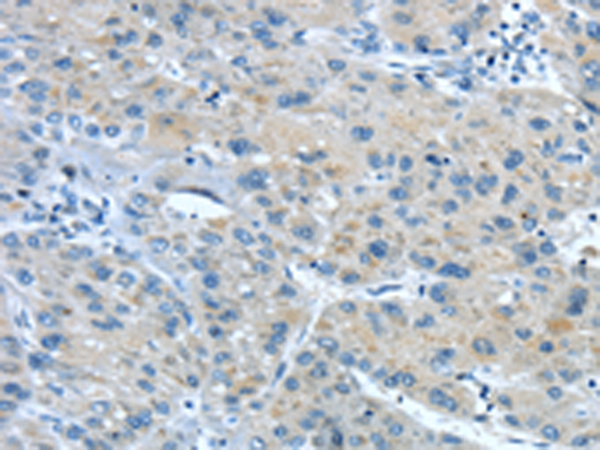

| WB | 咨询技术 | Human,Mouse,Rat |
| IF | 咨询技术 | Human,Mouse,Rat |
| IHC | 1/25-1/100 | Human,Mouse,Rat |
| ICC | 技术咨询 | Human,Mouse,Rat |
| FCM | 咨询技术 | Human,Mouse,Rat |
| Elisa | 1/2000-1/5000 | Human,Mouse,Rat |
| Aliases | VAN; NAF1; ABIN-1; nip40-1 |
| WB Predicted band size | 72 kDa |
| Host/Isotype | Rabbit IgG |
| Antibody Type | Primary antibody |
| Storage | Store at 4°C short term. Aliquot and store at -20°C long term. Avoid freeze/thaw cycles. |
| Species Reactivity | Human, Mouse |
| Immunogen | Synthetic peptide of human TNIP1 |
| Formulation | Purified antibody in PBS with 0.05% sodium azide and 50% glycerol. |
+ +
以下是3篇涉及TNIP1抗体的研究文献摘要简述:
1. **《TNIP1 inhibits autophagy in inflammatory responses via binding to ATG16L1》**
- 作者:Zhong Z, et al.
- 摘要:研究通过免疫共沉淀和Western blot(使用TNIP1抗体)发现TNIP1通过与自噬相关蛋白ATG16L1相互作用,抑制炎症反应中的过度自噬,揭示其在调控免疫稳态中的作用。
2. **《ABIN-1 (TNIP1) regulates T cell activation and murine lupus pathogenesis》**
- 作者:Nanda SK, et al.
- 摘要:利用TNIP1特异性抗体进行小鼠模型组织分析,证实TNIP1缺失导致T细胞过度活化并加剧狼疮样症状,提示其作为自身免疫疾病潜在治疗靶点。
3. **《TNIP1 modulates psoriasis-associated inflammation through NLRP3 inflammasome suppression》**
- 作者:Li H, et al.
- 摘要:通过免疫荧光(使用TNIP1抗体)发现TNIP1在银屑病皮肤组织中表达下调,其缺失通过激活NLRP3炎症小体加剧炎症,为TNIP1在皮肤免疫中的保护作用提供证据。
TNIP1 (TNFAIP3-interacting protein 1), also known as ABIN1 (A20-binding inhibitor of NF-κB 1), is a ubiquitin-binding protein involved in regulating inflammatory signaling pathways, particularly the NF-κB and mitogen-activated protein kinase (MAPK) pathways. It interacts with TNFAIP3 (A20), a critical negative regulator of inflammation, to suppress NF-κB activation and maintain immune homeostasis. TNIP1 plays a role in preventing excessive immune responses and has been implicated in autoimmune diseases, such as psoriasis, systemic lupus erythematosus (SLE), and rheumatoid arthritis, as well as cancers and metabolic disorders.
TNIP1 antibodies are essential tools for studying the protein's expression, localization, and function in both physiological and pathological contexts. These antibodies are commonly used in techniques like Western blotting, immunohistochemistry (IHC), immunofluorescence (IF), and co-immunoprecipitation (Co-IP) to investigate TNIP1's interactions with signaling molecules, its post-translational modifications, and its regulatory effects on inflammatory pathways. Researchers also utilize TNIP1 antibodies to explore its role in disease mechanisms, particularly in tissues where dysregulated NF-κB signaling contributes to pathogenesis. Validated antibodies are critical for ensuring specificity, given the structural similarities among ABIN protein family members. Recent studies have highlighted TNIP1's potential as a therapeutic target or biomarker, driving demand for reliable antibodies to support translational research.
×